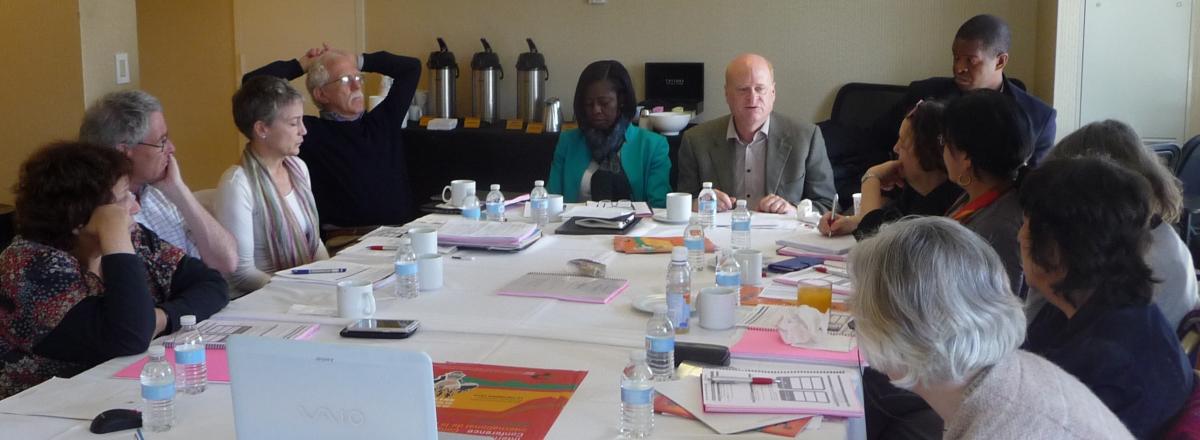IUSSP Council MeetingWashington, D.C, United States, 2-3 April 2016
The annual meeting of the IUSSP Council was held on Saturday 2 April and Sunday 3 April in Washington, D.C., just after the Population Association of America’s (PAA) Annual Meeting. The place and date was chosen to bring together a maximum number of council members while limiting costs. Only Sureeporn Punpuing and Tom Moultrie were unable to attend, though Tom Moultrie was able to participate from South Africa via video conference. Mary Ellen Zuppan, Executive Director, and Paul Monet, Deputy Executive Director, also attended the meeting. The Council reviewed the activities from the previous year and the Officers asked the Council members for advice on new directions. The Council also approved the accounts and decided on budget priorities. As is generally the case, the two days of meetings were intensive. In addition to the recurring agenda items, two topics were the object of particular attention: preparations for the next International Population Conference, which will take place in Cape Town (South Africa) from 29 October to 4 November 2017, and the future of the association, given growing difficulties in raising funds for operation costs.
The Call for Papers for the 2017 Conference was launched just prior to the Council meeting. Brochures in French and English listing the themes and topics were distributed at the IUSSP stand during the PAA meeting and have also been mailed out to members. The website for submitting abstracts online will open in September 2016 using Confex software (the same company now used by PAA) with the deadline to submit abstracts set for 15 December 2016. Session organisers and Theme conveners will select abstracts for oral and poster sessions in early 2017. They will be assisted by reviewers who will help evaluate submissions. The Council also discussed the format of plenary and invited sessions, including a proposal to offer the possibility to institutions in the population field to organise a session during the conference on a population topic in exchange for a financial contribution in support of the Conference, as well as other possibilities to attract sponsors for the Conference.
Even before holding the 2017 Conference, it is already time to think about organising the 2021 Conference. A call for candidates has already been launched to obtain solid proposals before the end of 2016. Council members will be encouraging their colleagues in different countries to consider the adventure. A number of potential host countries are already under exploration. In recent decades the Conference has been organised in Conference centers, which provide excellent facilities for the Conference but also represent an important cost for the host country organisation. The Council is also open to alternative venues such as university campus facilities or Conference hotels that might provide some cost savings.
The two days of the Council meeting were also an opportunity to reflect on IUSSP’s future. On the afternoon of the first day, Council members exchanged ideas on how to strengthen the association, improve membership retention, and attract new funding sources. IUSSP is faced with several challenges. Membership numbers and revenue drop significantly in the years between International Population Conferences while grants to support operations are increasingly difficult if not impossible to secure. In recent years, IUSSP has succeeded in maintaining numerous activities thanks to project funding, notably funds to support demographic training in Francophone Africa and most recently to support the involvement of demographers in the Data Revolution thanks largely to funding from the William and Flora Hewlett Foundation and UNFPA. Thanks to a grant from the Hewlett Foundation, IUSSP recently recruited a consulting agency, Ethicore, with experience working with NGOs and associations, to help the Union develop a new communications and fundraising strategy as well as review the IUSSP business plan. The morning of the second day of the Council meeting was devoted to an exchange between Council members and Ethicore’s consultant, Rachael Clay. The session began by focusing on each Council member’s vision of IUSSP: the Union’s strong points and weak points, how it could better attract new members and retain current members, potential alternative sources of funding, and new partnership opportunities, notably with regional associations, etc. Ethicore will draft a report that will be delivered in September, drawing on exchanges with Council members, as well as interviews with other stakeholders including former Council members and donor agencies, reviews of IUSSP documentation and budgets and discussions with IUSSP Officers and Secretariat staff. The report will help Council define new directions and reinforce the influence of the Union, without renouncing its traditional activities that have always been appreciated such as the International Population Conference and the activities of IUSSP Scientific Panels.
The Council meeting was as always an opportunity to review the activities developed over the past year by the officers and Secretariat:
Finally, the Council commissioned a small group among its members to work on a revision of the Union’s Constitution. The principal aim is to adapt to new communication practices. The amendments will be submitted to the members’ vote in 2017. |
|

